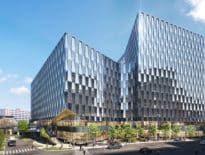
Jarred Johnson
Massachusetts has a powerful tool that can help address our climate crisis by both reducing vehicle emissions and giving our residents increased transportation choices that are affordable, safe and healthy. The strong Massachusetts environmental review process (conducted through the Massachusetts Environmental Policy Act, or MEPA) should be updated to ensure that walking, transit and biking access are more holistically considered in those reviews.
The “transportation” section of the current environmental notification form process is currently car-centric. Instead, we need to ensure that new development in the commonwealth supports our climate goals and shapes a healthier, safer, more accessible and more vibrant state. An updated MEPA can help ensure that the next generation of developments meets the demand for car-lite living, by encouraging developers and municipalities to work together to prioritize walking, biking and transit and improve connectivity for those modes across the state.
Often, environmental concerns and increased development are presented as being in opposition. This is a false choice that obscures the potential of denser, car-lite development to help us meet our climate goals while addressing our housing crisis.

Stacey Beuttell
New construction across Massachusetts creates controversy due to concerns about traffic and land use mix. But often, the real problem is the addition of more cars to local streets, not the addition of more housing to a neighborhood. We need to develop more multifamily and small-lot homes to address our housing crisis, and we need to do it without increasing the number of vehicles that are in our communities.
The benefits of reforming MEPA as we suggest are manifold: more space for housing and commercial units, more money for affordable housing and retail space and cleaner air.
Future-Proof Your Property
This isn’t about making development more expensive – it’s about prioritizing different considerations in development to deliver maximum benefits to current and future stakeholders.
Making a development more pedestrian-friendly includes designing sites with better connections to existing sidewalks, rail trails or transit stops, and putting parking behind the building instead of on the street. By being proactive about serving people walking, biking and taking transit, developers can increase the attractiveness of their developments and future-proof their properties.
Reducing cars in new developments will be popular. A MassINC poll from 2021 surveyed residents inside Route 128 and found that 71 percent to 79 percent of respondents wanted more outdoor dining, wider sidewalks and separated bike lanes. Critically, residents supported these changes even if it meant less space for cars. The popularity of car-free areas like Moody Street in Waltham and the hundreds of walking/biking/transit projects across Massachusetts funded through the MassDOT Shared Streets and Spaces and Complete Streets programs show this is more than an urban phenomenon.
Fewer and slower cars also mean safer streets and fewer traffic fatalities and injuries. Despite a significant drop in traffic in 2020, traffic fatalities went up! This was a result of fewer vehicles giving drivers the confidence to speed down empty streets. Across the country, we are seeing increased pedestrian fatalities caused by government inattention to walking safety at a time when vehicles are heavier, taller, accelerate faster and contain ever more distractions.
Massachusetts residents need municipalities and developers to make safer streets a priority. New developments can be a major opportunity to add safe crossing infrastructure, traffic-calming measures, safe and protected bicycle lanes and more.
Building on the recent addition of environmental justice requirements to the MEPA review process, it is particularly critical for MEPA transportation reviews to reflect the needs of the more than 30 percent of Massachusetts residents who do not drive. Making our streets safer and more accessible shouldn’t be an afterthought. Instead, it will make our communities more attractive and popular places to live, work and play.
Jarred Johnson is executive director of TransitMatters and Stacey Beuttell is executive director of WalkBoston.






